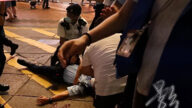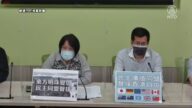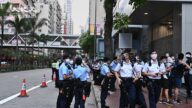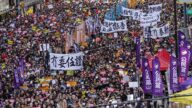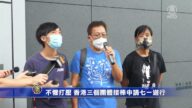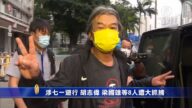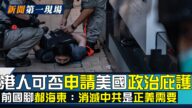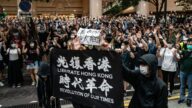【新唐人2012年9月3日訊】繼7月29號,9萬香港民眾舉行大遊行,敦促香港政府撤回所謂的「國民教育」之後,9月1號又有超過4萬港人舉行集會,反對港府協助中共對香港學生進行紅色洗腦。同時,香港青年學生們的絕食抗議也從8月31號接續到9月2號。但迄今,港府還沒有撤銷國民教育科的表示。
民間反對國民教育科大聯盟發言人瀋偉男:「政府一天不撤回,我們一天都不會撤走,我覺得這是非常強烈的訊號。」
9月1號,香港「民間反對國民教育大聯盟」在港府旁邊的添馬公園集會,呼籲「以良心守護孩子」,有超過4萬人出席,其中很多是家長和孩子。主辦方強調,如果當局9月3號前不撤回洗腦科目,他們將會升級行動,有可能進行罷課。
去年5月份,香港政府決定將「德育及國民教育科」列為香港中小學必修課,並要求各學校在3年內實施。而在香港國民教育服務中心出版的國民教育參考書中,大部分內容是在為中共歌功頌德,掩蓋它的醜事。
這種所謂的「國民教育」立即引來了香港民眾接連不斷的抗議浪潮。
8月30號,香港學生組織「學民思潮」成員和一些學生,在港府總部大樓前集會並架起帳幕,展開「佔領政府總部行動」。其中3名學民思潮成員進行絕食抗議,要求政府撤回「國民教育科」。
香港作家張成覺:「參加絕食的學生充滿了年輕人的激情和正義感,他們能夠對北京政權、這個強權政治的洗腦做法,用行動來說不,這是很令人振奮的事情。」
同時,「學民思潮」成員在政府總部的抗議也在繼續。9月2號,3位絕食中學生停止絕食後,又有另外10名大學生、教師開始絕食。
對此,15歲就參加了89年學生運動的北京維權人士胡佳深有體會。他認為,香港的學生完全有獨立判斷的能力,他們作為公民有權利採取這種行動給政府施壓。
2006年,北京維權人士胡佳因為和高智晟律師參與中國維權絕食接力被抓捕。在被監禁中,胡佳曾經絕食長達30天。他非常了解絕食的痛苦。
胡佳:「當這3名中學生停止絕食的時候,我很欣慰地看到,一些大學生開始接力。我真的希望這個絕食能夠一直堅持,直到香港政府收回國民教育科。」
89六四民運人士方政指出,香港所傳承下來的民主自由理念,對中國大陸有很大影響。每年都有一些大陸人來香港參加六四燭光晚會。
89六四民運人士方政:「香港的存在對中國大陸的這種集權統治、對共產黨政權、對一黨專政,是一個最大的威脅。它(中共)害怕了,所以它要來這樣(搞國民教育洗腦)。我覺得這是一個戰鬥、一個自由陣地的征戰,非常重要。」
方政強調,今天的中共民心全失、逆天而行,即使它強行在香港推行洗腦課,也會遭到更強大的反彈,以失敗告終。
2003年,港府曾經遵從中共旨意,要在香港實施《國家安全條例》,也就是俗稱的23條,打壓香港的民主自由,但遭到香港民眾的強烈反對。2003年7月1號,超過50萬港人上街抗議23條立法。最後,港府被迫讓步,宣佈擱置23條。
採訪/易如 編輯/李謙 後製/蕭宇
Hong Kong Students Go on with Hunger Strike against CCP Brainwashing
Following the protest by 90,000 people on July 29 urging
Hong Kong government to withdraw the “national education"
program, on September 1, more than 40,000 people held a rally
against HK Government, which assists the Communist regime’s educational brainwashing plan.
HK students also began a hunger strike on August 31.
To date, HK government has no plan to revoke the National Education plan.
Spokesman of the alliance of activists against the
national education program, Shen Weinan says,
“We will not leave as long as the Government does not
withdraw the program. I think this is a very strong signal."
September 1, Hong Kong’s alliance of activists against
the national education program, conducted a rally at Tamar Park calling to “guard the children with conscience”.
More than 40,000 people attended the rally,
many of whom were parents and children.
Organizers stressed that if the authorities do not withdraw
the brainwashing program, they will upgrade the action and carry out the students strike.
Last May, the Hong Kong government listed the “moral
and national education" as mandatory in elementary and
secondary schools, as well as required implementation
of the subject in three years.
National education guidelines published by the National
Education Services Center of Hong Kong includes pro-communist content and ignores scandals of the regime.
This “national education" guideline immediately caused
waves of protests by the people of Hong Kong.
August 30, Scholarism, an organization composed of
Hong Kong secondary students, and many other students,
gathered in front of Government Secretariat and set up the
protest carnival to “occupy the government headquarters.”
Three members of Scholarism started a hunger strike to ask
Hong Kong to withdraw the “national education" lessons.
Hong Kong writer Zhang Cheng-Jue: “The hunger strike
students are full of passion and a sense of justice for the youths.
They say no to the Beijing regime, to the brainwashing
practices of the power with their actions. This is very exciting."
The protest at the government headquarters continues
on September 2,
as 10 more university students and teachers went on the hunger
strike when the 3 high school students ended their hunger strike.
Hu Jia is a Beijing activist who joined the
1989 student movement at age of 15.
He shares his deepest appreciation of this protest.
He believes Hong Kong students are capable of independent
judgment, and as citizens, they have the right to take such action to pressure the government.
In 2006, Beijing human rights activist Hu Jia was arrested
for joining a hunger strike with Chinese lawyer Gao Zhisheng.
During the imprisonment, Hu Jia went on hunger strike
for 30 days. He is well aware of the pain of hunger strike.
Hu Jia: “When three high school students ended the hunger
strike, I was very pleased to see that some college students continued the relay.
I really hope that this hunger strike will go on until the Hong
Kong Government revokes the national education lessons."
Fang Zheng, a June 4 pro-democracy activist, indicates that
the concept of democracy and freedom inherited in Hong Kong has a great influence on the mainland.
Every year, a number of mainlanders come to Hong Kong
to participate in the candlelight vigil commemorating victims of the June 4 massacre.
Pro-democracy activist Fang Zheng: “The presence of Hong
Kong has been the biggest threat to the authoritarian Communist regime.
The CCP has fear and thus engages the National Education
brainwashing program. This is a battle, a very important expedition for freedom."
Fang Zheng stresses that the communist regime has totally
lost its popularity with the people.
The brainwashing plan in Hong Kong will only meet with
a stronger rebound and end in failure.
In 2003, Hong Kong security law, i.e.,
the Basic Law Article 23,
was suggested to comply with the communist regime
decree to suppress democracy and freedom in Hong Kong, but met with strong opposition.
July 1, 2003, more than 500,000 Hong Kong people took
to the streets to protest against the Article 23 legislation.
Finally, the HK Government was forced to make
concessions and announced the shelving of Article 23.


